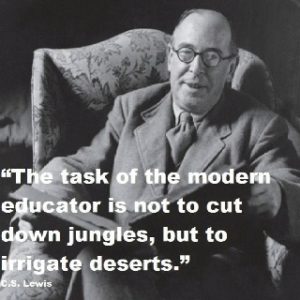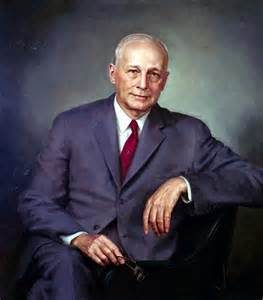 Another academic year approaches. I will begin my 28th year of teaching full-time at the college level. As I contemplate this new beginning (every new teaching session feels like a new beginning to me), I reflect on how C. S. Lewis understood education. His Abolition of Man is key to his understanding, but one can also get some insight from his letters to Americans. Those are the letters I know best after delving into them for my upcoming book. As I was picking and choosing what to share from those letters in the book, I included some of Lewis’s poignant comments on education.
Another academic year approaches. I will begin my 28th year of teaching full-time at the college level. As I contemplate this new beginning (every new teaching session feels like a new beginning to me), I reflect on how C. S. Lewis understood education. His Abolition of Man is key to his understanding, but one can also get some insight from his letters to Americans. Those are the letters I know best after delving into them for my upcoming book. As I was picking and choosing what to share from those letters in the book, I included some of Lewis’s poignant comments on education.

Warfield Firor, an esteemed surgeon at Johns Hopkins, was a long-time correspondent with Lewis. Firor and Lewis met face-to-face in Oxford once and Firor was a guest at an Inklings meeting. When he returned to America, their correspondence deepened into many subjects, one of which was education.
One of Lewis’s letters to Firor was devoted to a critique of education, at least the way it was being carried out at that time. What is most interesting about this particular letter is that it contains sentiments about education that one might not expect from such an esteemed scholar. While Lewis certainly believed in high standards (witness the testimony of those he tutored), he also saw a bad trend in the early years when children needed more time to be children.
He was deeply concerned that education had turned into more of a competition, even of a ruthless nature. While competition itself was not evil, he told Firor that children needed time to be children. Why, he complained, did one’s entire childhood and the college years always have to be a constant exam preparation? Was this really good for the children? What kind of nation would this produce psychologically, morally, and spiritually?
 In a letter to another regular American correspondent, Vera Gebbert, Lewis remarked on the deplorable state of education in both England and America, opining that both countries offered very little in the way of a solid education. He was fortunate, he told her, that his father had sent him to a private tutor after his own miserable experiences at schools.
In a letter to another regular American correspondent, Vera Gebbert, Lewis remarked on the deplorable state of education in both England and America, opining that both countries offered very little in the way of a solid education. He was fortunate, he told her, that his father had sent him to a private tutor after his own miserable experiences at schools.
In his very next letter, in response to her information about the kind of school her son was attending, he again took aim at the way English schools were being run, devoid of a real understanding of education. The educational authorities seemed to think that spending money on better facilities would guarantee a great education, but Lewis pointedly remarked that genuine education in the hands of a very good teacher could take place in a ramshackle building, while the best facilities in the world could never make up for the tutelage of bad teachers.
I loved reading that last remark from Lewis. I’ve always maintained that real education doesn’t take as much funding as people think. Apart from paying teachers what they are really worth (I won’t get into that right now), fancy buildings, while wonderful, don’t guarantee good education. A devoted, enthusiastic teacher does.
I’ve rarely wavered in my enthusiasm for teaching, even during some of the roughest patches of my life when discouragement threatened to overwhelm. To all teachers out there, especially those who seek to imbue their students with a love of learning that comes directly from the heart of God—don’t lose heart yourselves. I always come back to this Scripture in Galatians:
For whatever a man sows, this he will also reap. . . . Let us not lose heart in doing good, for in due time we will reap if we do not grow weary.
May weariness never overtake you. May the Lord lift you up and encourage you on this path. You will reap what you have sown.
